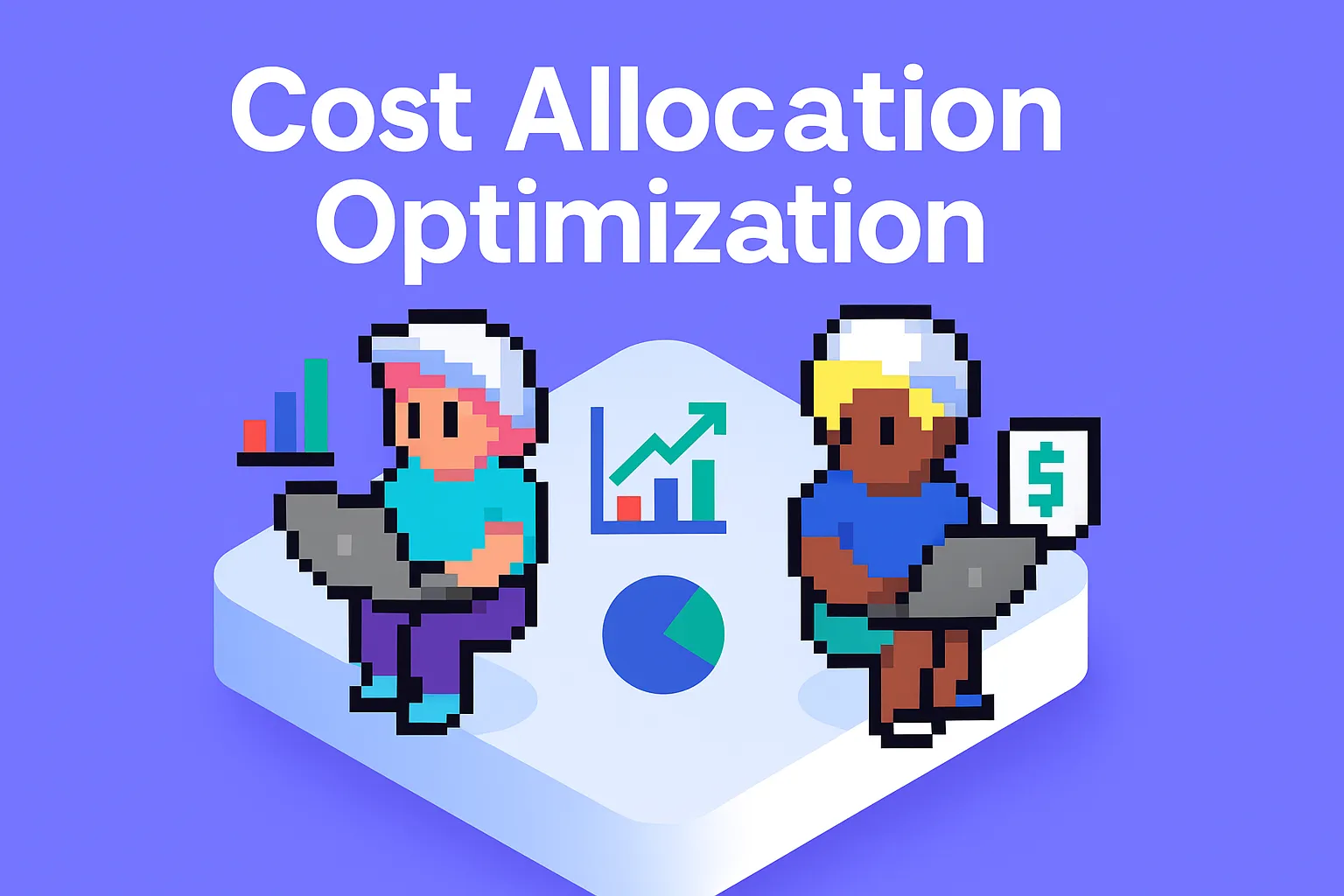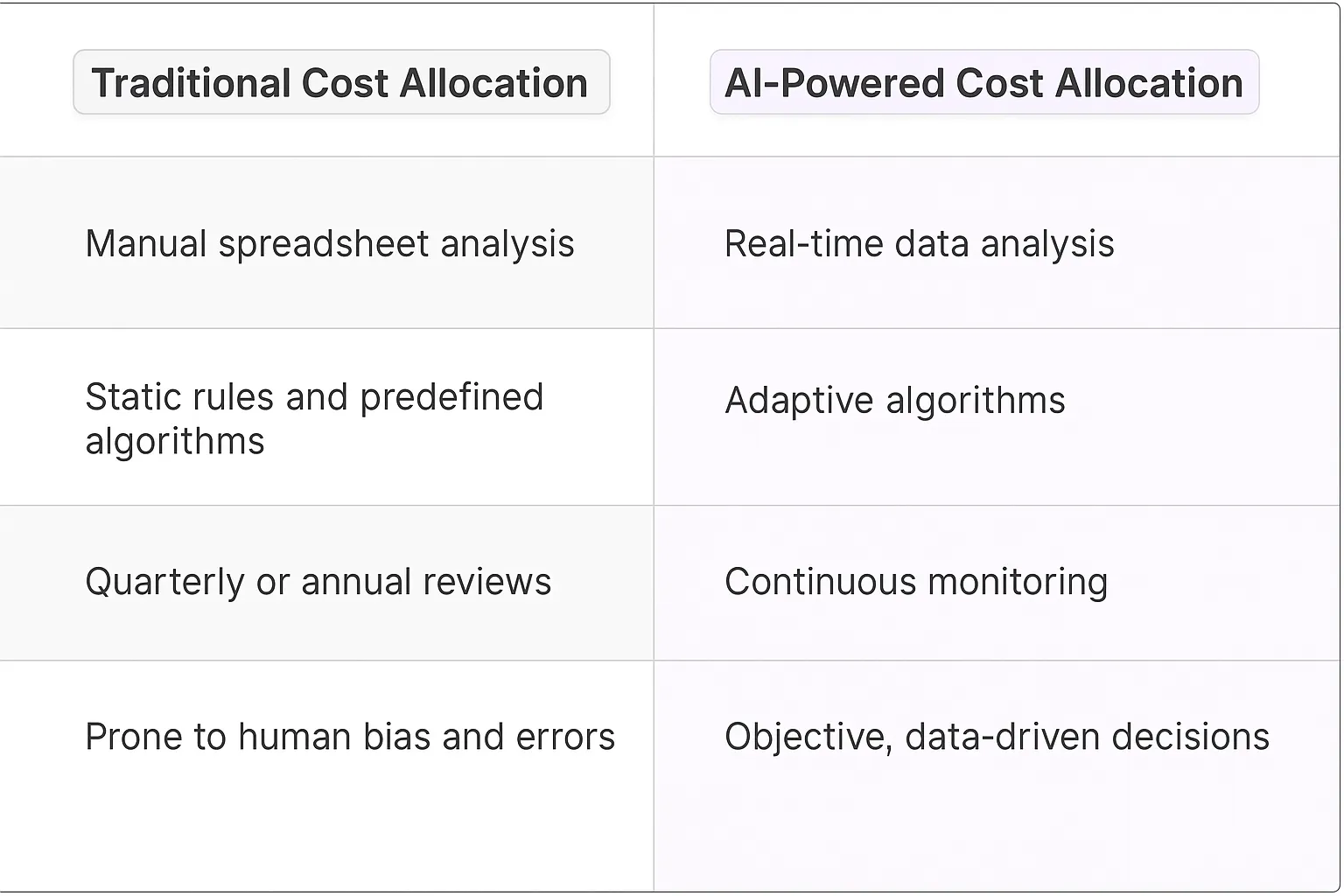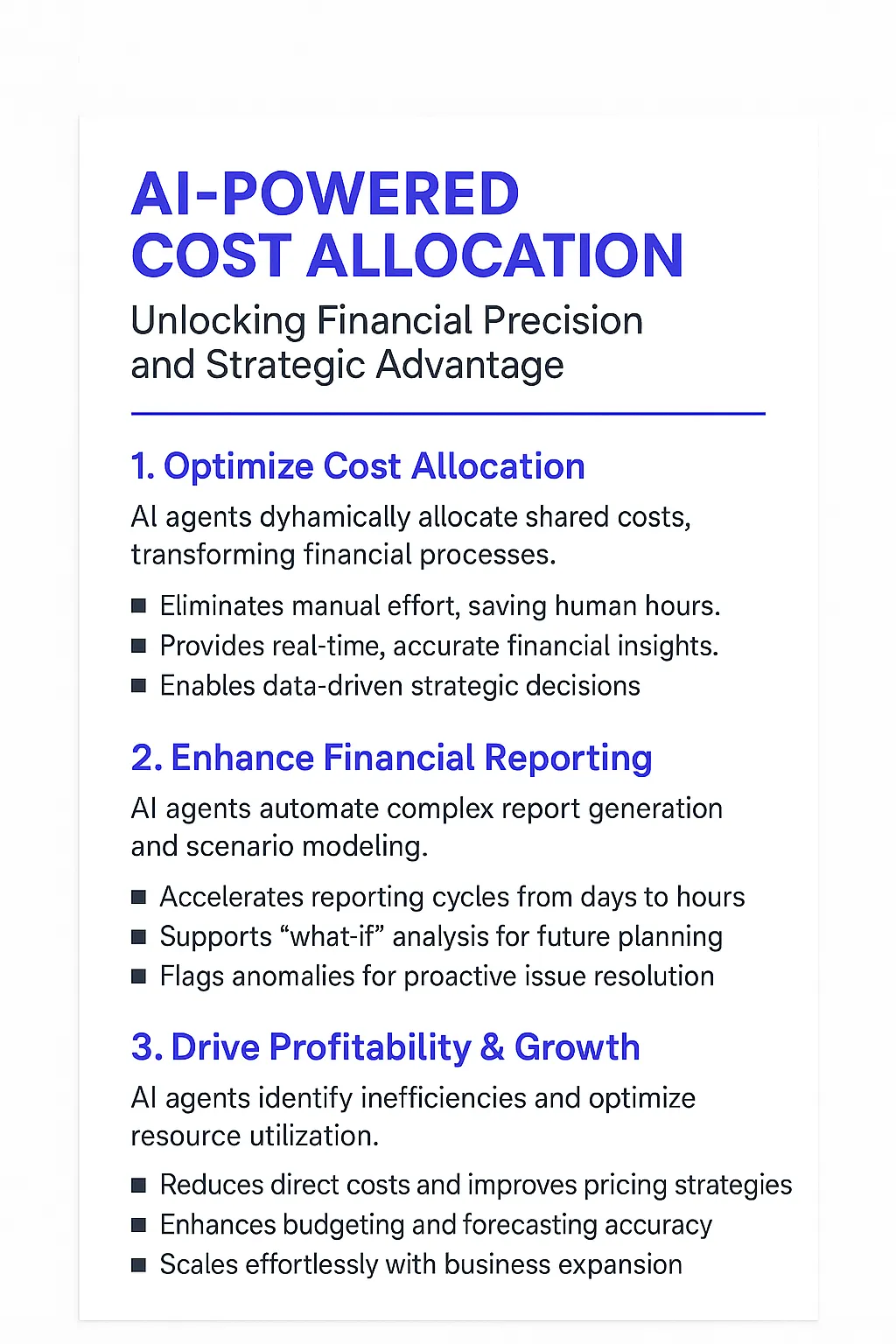Cost Allocation Optimization AI Agents
Revolutionizing Financial Management with AI-Powered Cost Allocation
What is Cost Allocation Optimization?
Cost Allocation Optimization is the process of distributing an organization's expenses across various departments, projects, or products in the most efficient and accurate manner possible. It's a critical financial practice that impacts everything from pricing strategies to performance evaluations. In the past, this was a manual, often imprecise process. Now, AI is turning it into a data-driven powerhouse.
Key Features of Cost Allocation Optimization
When powered by AI agents, Cost Allocation Optimization takes on a whole new level of sophistication. These systems can:1. Analyze vast amounts of financial data in real-time2. Identify subtle patterns and correlations human analysts might miss3. Adapt to changing business conditions on the fly4. Provide predictive insights for future cost allocations5. Integrate seamlessly with existing financial systems6. Reduce human bias in financial decision-making7. Scale effortlessly as organizations grow and evolveThese features aren't just incremental improvements - they're game-changers that are reshaping how businesses approach financial management.

Benefits of AI Agents for Cost Allocation Optimization
What would have been used before AI Agents?
Before AI agents entered the scene, cost allocation optimization was a manual, time-consuming process. Finance teams would spend countless hours poring over spreadsheets, trying to make sense of complex financial data. They'd rely on static rules and predefined algorithms that couldn't adapt to the ever-changing business landscape. It was like trying to solve a Rubik's cube blindfolded – possible, but incredibly inefficient and prone to errors.
Companies often resorted to hiring expensive consultants or building in-house teams dedicated to this task. These approaches were not only costly but also struggled to keep up with the dynamic nature of modern businesses. The result? Suboptimal cost allocation that could lead to misaligned incentives, inaccurate pricing, and ultimately, reduced profitability.
What are the benefits of AI Agents?
Enter AI agents for cost allocation optimization. These digital teammates are game-changers, bringing a level of sophistication and adaptability that traditional methods simply can't match. Here's why they're transforming the landscape:
1. Adaptive Learning: AI agents don't just follow rules; they learn and evolve. They can identify patterns in your financial data that human analysts might miss, constantly refining their algorithms to provide more accurate and relevant cost allocations over time.
2. Real-time Optimization: Unlike quarterly or annual reviews, AI agents can continuously analyze and adjust cost allocations. This real-time optimization ensures that your financial decisions are always based on the most current data, giving you a competitive edge in fast-moving markets.
3. Scalability: As your business grows, so does the complexity of cost allocation. AI agents can handle this increased complexity with ease, scaling their capabilities to match your business needs without requiring a proportional increase in human resources.
4. Reduced Bias: Human decision-making can be influenced by cognitive biases. AI agents, while not entirely free from bias, can provide a more objective view of cost allocation, potentially uncovering inefficiencies that might have been overlooked due to institutional blindspots.
5. Scenario Modeling: AI agents excel at running multiple "what-if" scenarios quickly. This capability allows businesses to test different cost allocation strategies and understand their potential impacts before implementation, reducing risk and improving decision-making.
6. Integration Capabilities: These digital teammates can easily integrate with your existing financial systems, pulling data from various sources to provide a holistic view of your cost structure. This integration eliminates data silos and provides a more comprehensive basis for cost allocation decisions.
7. Freeing Up Human Capital: By automating the heavy lifting of cost allocation, AI agents free up your finance team to focus on higher-value strategic tasks. Instead of getting bogged down in spreadsheets, they can spend more time interpreting results and developing strategic recommendations.
The bottom line? AI agents for cost allocation optimization aren't just an incremental improvement – they're a quantum leap forward. They're enabling businesses to make smarter, faster, and more accurate financial decisions. In the high-stakes world of business finance, that's not just an advantage – it's a necessity for staying competitive.

Potential Use Cases of AI Agents for Cost Allocation Optimization
Processes
Cost allocation optimization is a critical process for businesses aiming to maximize efficiency and profitability. AI agents can revolutionize this field by bringing unprecedented precision and adaptability to the table. Let's dive into some key processes where these digital teammates shine:
- Real-time resource tracking: AI agents can continuously monitor resource usage across departments, projects, and teams, providing up-to-the-minute insights on cost distribution.
- Predictive modeling: By analyzing historical data and current trends, AI can forecast future cost allocations, helping businesses plan more effectively.
- Automated cost attribution: AI agents can intelligently attribute costs to specific projects, products, or departments based on complex sets of rules and real-world usage patterns.
- Dynamic budget adjustments: As market conditions or business priorities shift, AI can suggest and implement budget reallocations in real-time.
- Anomaly detection: AI agents can quickly identify unusual spending patterns or cost allocations, flagging potential issues for human review.
Tasks
Breaking down these processes, we can identify specific tasks where AI agents excel in cost allocation optimization:
- Data aggregation: Pulling cost data from various sources (ERP systems, project management tools, time-tracking software) into a unified view.
- Cost driver analysis: Identifying and quantifying the factors that most significantly impact costs across different business units.
- Scenario modeling: Running multiple "what-if" scenarios to determine optimal cost allocation strategies under different conditions.
- Report generation: Creating detailed, customized reports on cost allocation for different stakeholders, from C-suite executives to project managers.
- Compliance checking: Ensuring that cost allocations adhere to relevant accounting standards and internal policies.
- Optimization recommendations: Suggesting specific actions to improve cost allocation efficiency based on AI-driven analysis.
In the world of cost allocation optimization, AI agents aren't just tools – they're game-changers. They bring a level of speed, accuracy, and insight that's simply not achievable through traditional methods. By leveraging these digital teammates, businesses can unlock new levels of financial efficiency and strategic agility.
The real power of AI in this context lies in its ability to handle complexity at scale. As businesses grow and their cost structures become more intricate, AI agents can adapt and scale their capabilities accordingly. They can process vast amounts of data, identify subtle patterns, and make nuanced decisions that would be overwhelming for human analysts.
Moreover, these AI agents learn and improve over time. They can refine their algorithms based on feedback and outcomes, continuously enhancing their accuracy and effectiveness. This creates a virtuous cycle of optimization – the more you use them, the better they get.
But it's crucial to remember that AI agents are not replacing human financial experts. Instead, they're augmenting human capabilities, freeing up finance professionals to focus on high-level strategy and decision-making. The most successful implementations of AI in cost allocation optimization will be those that effectively blend AI capabilities with human insight and judgment.
As we look to the future, the potential applications of AI in cost allocation optimization are boundless. From integrating with IoT devices for even more granular resource tracking to incorporating external economic data for more accurate forecasting, we're just scratching the surface of what's possible. Businesses that embrace these technologies early and effectively will gain a significant competitive advantage in the years to come.

Industry Use Cases: Cost Allocation Optimization AI Agents
The versatility of AI agents in cost allocation optimization makes them valuable across various industries. Let's dive into some meaty, industry-specific use cases that showcase how AI can transform workflows and processes.
These digital teammates aren't just fancy calculators – they're financial wizards that can crunch numbers, spot patterns, and make recommendations that would make even the most seasoned CFO raise an eyebrow. They're like having a team of expert analysts working 24/7, but without the need for coffee breaks or office politics.
From tech startups to Fortune 500 giants, organizations are leveraging these AI agents to gain a competitive edge in their financial operations. They're not just optimizing costs; they're unlocking hidden value and driving strategic decision-making in ways that were previously unimaginable.
So, buckle up as we explore how these AI-powered financial gurus are reshaping industries and redefining what's possible in cost allocation. Trust me, by the end of this, you'll be wondering how businesses ever managed without them.
Manufacturing: Precision Cost Allocation with AI
The manufacturing industry is ripe for a cost allocation revolution, and AI agents are the perfect catalysts. Let's dive into how these digital teammates can transform the way factories allocate costs, boosting efficiency and profitability.
In a typical manufacturing plant, costs are often distributed using outdated methods that fail to capture the nuances of modern production processes. Enter AI-powered cost allocation agents. These sophisticated algorithms can analyze vast amounts of data from IoT sensors, production logs, and financial systems to create a hyper-accurate picture of where every cent is going.
Imagine a car factory where AI agents track the energy consumption of each robot, the time spent by human workers on different tasks, and the exact amount of raw materials used for each vehicle model. The AI doesn't just crunch numbers; it identifies patterns and anomalies that human accountants might miss.
For instance, the AI might discover that a particular welding process is consuming 15% more energy for luxury models compared to standard ones. This granular insight allows managers to adjust pricing strategies or invest in more efficient equipment for high-end production lines.
But the real magic happens when these AI agents start predicting future costs. By analyzing historical data and market trends, they can forecast how changes in raw material prices or labor costs will impact different product lines. This foresight enables manufacturers to make proactive decisions, like hedging against price increases or redesigning products to use more cost-effective components.
The ripple effects of this precision cost allocation are significant. Product managers can make data-driven decisions about which models to push or discontinue. Supply chain teams can negotiate better deals with suppliers based on accurate usage data. And CFOs can present shareholders with crystal-clear breakdowns of profitability by product line, factory, or even individual machine.
In the cutthroat world of manufacturing, where margins are often razor-thin, this level of cost clarity isn't just nice to have—it's a competitive necessity. The companies that embrace these AI-driven cost allocation systems will be the ones writing the playbook for 21st-century manufacturing efficiency.
Real Estate: AI-Driven Cost Allocation for Property Management
The real estate industry is sitting on a goldmine of untapped data, and AI-powered cost allocation agents are about to blow the lid off traditional property management. Let's break down how these digital teammates are reshaping the economics of real estate portfolios.
In the world of commercial and residential property management, costs have traditionally been allocated using broad-brush approaches that often miss the nuances of individual properties and tenants. AI agents are changing this game by diving deep into the data pools that properties generate 24/7.
These AI systems ingest data from smart building systems, occupancy sensors, maintenance logs, and utility meters to create a living, breathing model of each property's cost structure. They're not just passive observers; they're active participants in the cost allocation process.
For a multi-use skyscraper in downtown Manhattan, an AI agent might discover that the HVAC system is overcompensating for heat generated by a data center on the 15th floor, leading to excessive cooling costs for tenants on surrounding floors. This granular insight allows property managers to implement fair cost allocation and potentially redesign the building's climate control strategy.
But the real power move comes when AI starts predicting and optimizing future costs. By analyzing historical data, weather patterns, and upcoming events, these systems can forecast utility usage, maintenance needs, and even potential tenant turnover. This foresight enables property managers to budget with unprecedented accuracy and implement proactive measures to control costs.
The impact on the bottom line is substantial. REITs can now present investors with detailed breakdowns of profitability by property type, location, or even individual tenant. Asset managers can make data-driven decisions about which properties to acquire, renovate, or divest. And leasing teams can structure deals with tenants based on precise operational cost projections.
In the high-stakes world of real estate, where location has always been king, data is emerging as the new crown jewel. The firms that leverage AI for cost allocation aren't just saving pennies; they're redefining what it means to be a savvy property manager in the digital age.
This isn't just about cutting costs—it's about creating a new paradigm for value in real estate. The companies that embrace these AI-driven systems will be the ones writing the next chapter in property management, where every square foot is optimized for profitability and sustainability.
Considerations
Technical Challenges
Implementing a Cost Allocation Optimization AI Agent isn't a walk in the park. It's more like trying to solve a Rubik's cube blindfolded while riding a unicycle. The technical hurdles are numerous and complex.
First off, data integration is a beast. You're dealing with financial data from multiple sources, often in different formats and with varying levels of granularity. It's like trying to make a smoothie with ingredients from different planets. The AI agent needs to be able to ingest, clean, and normalize this data without breaking a sweat.
Then there's the algorithm itself. Designing an AI model that can accurately predict and optimize cost allocation is like teaching a computer to play 4D chess. It needs to understand complex business rules, account for seasonal variations, and adapt to changing market conditions. And let's not forget about scalability - as your business grows, can your AI agent keep up without needing a supercomputer?
Security is another technical minefield. You're dealing with sensitive financial data, so your AI agent needs to be Fort Knox-level secure. Any breach could be catastrophic, not just in terms of data loss but also regulatory compliance.
Operational Challenges
On the operational side, things get even trickier. Implementing a Cost Allocation Optimization AI Agent is like trying to change the engine of a car while it's still running.
First, there's the human factor. Your finance team might view this AI agent as a threat rather than a digital teammate. It's crucial to get buy-in from the people who'll be working alongside this AI. You need to show them it's not about replacing them, but augmenting their capabilities. It's like giving them a financial superpower, not a pink slip.
Then there's the challenge of integration with existing processes. Your AI agent needs to play nice with your current financial systems and workflows. It's not just about technical integration, but also about fitting into established business processes. You might need to redesign some of these processes to fully leverage the AI's capabilities.
Training and maintenance are ongoing operational challenges. The AI agent isn't a set-it-and-forget-it solution. It needs constant feeding of new data and regular fine-tuning of its algorithms. This requires dedicated resources and expertise, which might be in short supply.
Finally, there's the ROI question. Implementing this AI agent is a significant investment, both in terms of money and time. Measuring its impact and justifying its cost can be tricky, especially in the short term. You need to have clear KPIs and a long-term vision to make this work.
In the end, implementing a Cost Allocation Optimization AI Agent is a complex undertaking. But for those who can navigate these challenges, the potential rewards in terms of financial efficiency and strategic insights are enormous. It's not just about cutting costs - it's about gaining a competitive edge in an increasingly AI-driven business landscape.
The Future of Financial Management: AI-Powered Cost Allocation
Cost Allocation Optimization AI Agents are more than just a trend - they're the future of financial management. By bringing machine learning and advanced analytics to bear on one of the most complex aspects of business finance, these digital teammates are unlocking new levels of efficiency and insight.The impact goes beyond just saving money or time. These AI agents are enabling businesses to make more informed strategic decisions, price products more accurately, and allocate resources more effectively. They're turning cost allocation from a necessary evil into a source of competitive advantage.However, implementing these systems isn't without challenges. From technical hurdles like data integration to operational issues like change management, organizations need to be prepared for a significant undertaking. But for those who successfully navigate these challenges, the rewards are substantial.As we move further into the age of AI, the businesses that thrive will be those that effectively leverage these technologies. Cost Allocation Optimization AI Agents aren't just tools - they're partners in building more efficient, more profitable, and more competitive organizations. The future of finance is here, and it's powered by AI.













